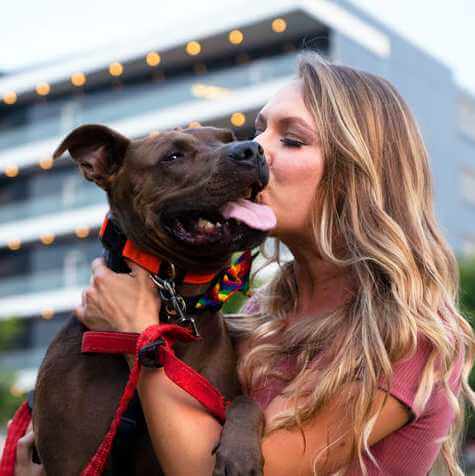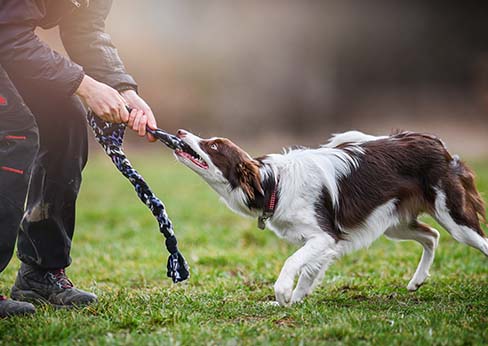In this post:
- What influences dog behavior?
- What plays a bigger role in dog behavior: Nature or Nurture?
This might possibly be a million-dollar question. When your dog starts barking at the wall, empties out your trash can, or decides to take a nap right in the middle of your doorway, it’d be really nice to know exactly what was going through their heads. Fortunately, there are ways to determine dog behaviors without having psychic abilities. To better understand our canine companions, we want to look at their environment and the behavior of humans around them.
What influences dog behavior?
Our first instinct is typically to focus on our dog. Why is he/she doing that? Are they hurt? Are they not feeling well? And while that is our natural instinct for a reason and we always recommend discussing any new behaviors or habits with your trusted veterinarian, let’s take a moment to think outside of the box.
Dr. Susan Friedman, Ph.D. (a psychology professor at Utah State University who has pioneered the application of Applied Behavior Analysis to captive and companion animals) says that behaviors are in the environment, not in the dog (paraphrased). What this means is that if you are focused on the environment and your behavior, as well as the behavior of other humans nearby, then your training will go much more smoothly because you’ll have a better understanding of what your dog is experiencing.
You can’t predict what’s going to happen, but you can prepare for how you’ll respond. While this is good advice for any situation, it goes double for dog training. Be prepared to respond to your dog’s various behaviors.
Here’s an example:
You work on training your dog in your living room and 8 am and it goes smoothly. He/she responds quickly and positively to all your commands.
Now let’s fast forward to 8 pm when your friends ring your doorbell with pizza and beer. You’re excited to see your friends, and that excitement transfers to your dog, allowing him/her to become distracted and completely disregard your commands.
Take a moment to consider a similar situation on a human level. Let’s say you’ve taken a one-mile walk or bike ride every night for 29 days. You’re 1 day away from a month, but your friend surprises you and stops by with a bottle of wine. What are the chances that you’re going to ask them to give you 15-20 minutes while you go for a quick bike ride? Distraction can be powerful.
So what do you do?
Another example comes to us from my sweet dog, Truffle. He’s pretty good with his “come” cue. He will immediately run to me every single time, tail wagging. However, when one of his friends is over, be it another doggo or kiddo, he turns a deaf ear to me. Now you might be thinking that Truffle is disobedient or stubborn, but that’s simply not the case. It’s just that he’s way more excited to see his friend than he is to obey my command to “come” at that moment. And I can’t say I blame him. It’s a lot of fun to get to hang out with your friends, especially if you haven’t seen them in a while.
In these situations, it’s all too easy for us to immediately get frustrated with our dogs. How could they be so scatterbrained? Why don’t they remember all those hours of training? They haven’t forgotten your training from earlier. They’re not being stubborn. They’re definitely not trying to assert their dominance over you.
Rather than getting frustrated with him, look at this as an opportunity to re-evaluate your training with this new environment to help him with his cues. It’s important to remember that when our dogs fail to listen to us, it’s not because they’re bad, stubborn, or ignorant, but because the environment is too distracting or because we haven’t provided enough positive reinforcement to make listening to their cue worth their time at that moment.
What plays a bigger role in dog behavior: Nature or Nurture?
“I interviewed Dr. Karen Overall, who has been the head of behavior at the University of Pennsylvania for many years. She said that 90% of dogs that are bred for a purpose failed to do their job. Whether their “job” was to detect bombs at the airport, guide the blind, or one of many other jobs. The reason for their failure is partly due to genetics (which really are a crapshoot) and partly due to humans and environmental conditions. We get so hung up on “my breeder said…” or “I read this article and…” but it’s far more important to pay attention to how your dog’s environment is affecting their behavior as indicated above and discussed by Dr. Susan Freidman. This is where we tend to make our judgment errors and mistakes. We are not paying attention to what humans are doing. We just expect the dog to know it all after a little bit of training in a controlled environment. Let me ask you this, does your dog ever cuddle up next to you when you’re feeling sad? Does their tail start to wag a little harder when you smile or laugh? They learn social cues off of you. It’s important to keep this in mind as you work with them. They look to humans to gauge reactions, both negative and positive.”
In the Genetics of Mouse Behavior: Interactions with Laboratory Environment study, several strains of mice were tested for their genetic predisposition to behaviors in three different laboratories. All of the mice were tested for six behaviors to see if there were any differences between the mice and one “mutant” strain of mice.
Their goal was to see if the mice had any similarities in behaviors if they were raised the same way. Not surprisingly, what they found was that even though there was a large correlation between genetics and behavior, all of the mice exhibited behavioral differences, which was caused (per the study) by environmental differences in their upbringing.
So … genetics don’t matter?
Let’s dig a little deeper. Carol Beuchat, Ph.D. (Scientific Director, Institute of Canine Biology) wrote: “The heritability for most behavioral traits is rather low. This doesn’t mean that genetics isn’t important for behavior, but that our ability to infer the genetics of an animal from observations of behavior is limited because environmental factors produce so much variability that the fraction of total variation that can be attributed to genes is small.” Low heritability means that it is hard for a breeder to know how a particular dog will behave.
So, yes, genetics plays a role in a dog’s behavior, but their environment shapes how that dog will express that behavior. If your dog has a “genetic” predisposition to being antisocial, you can accommodate by rigorous socialization training to help him/her compensate for their genetics.
Most dog’s behavior is not because of their genetics, but simply a reaction to their environment. They pull from their natural instinct and skillset to deal with particular situations. While we can’t alter their past experiences, we can take them into account as we train our companions. Not only will this go a long way in helping us understand them and bond with them, but it will make training progress much more quickly and be a lot more enjoyable.
Final Thoughts:
When it’s all said and done, we train our dogs because we love them. We want to help them adapt to our homes and become comfortable in them so that the environment is a happy and peaceful place. By keeping this in mind, you can make training a fun experience for both you and them. Don’t put so much pressure on your new family member. Remember that this is a learning experience for both of you and use it as an opportunity to get to know them even better, deepening your bond.
Special thanks to:
Drayton Michaels, CTC
Drayton Michaels, CTC is the owner of Urban Dawgs Dog Training in Red Banks, NJ. He also holds a Certification in Dog Training and Behavior Counseling from the San Francisco SPCA Academy for Dog Trainers.





